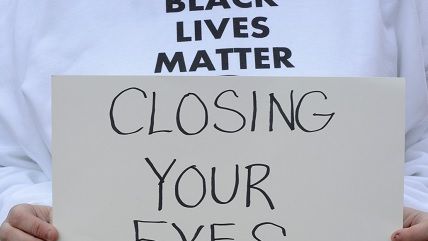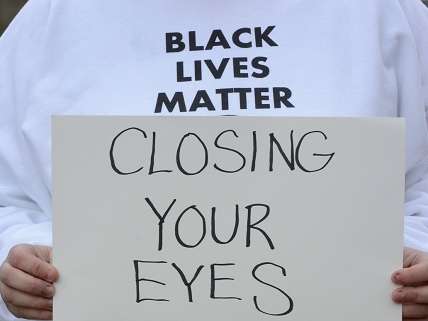Police Union Objects to 'Black Lives Matter' Shirts Being Sold on Amazon
FOP president calls the products "offensive," wants them removed.


The president of the Fraternal Order of Police urged Amazon CEO Jeff Bezos to remove shirts and sweatshirts with the slogans "Black Lives Matter," "Bulletproof," and the "urban myth of 'Hands Up, Don't Shoot'" from its website, saying in a letter the products were "offensive to the public" and "may damage your company's good name amongst FOP members and other active and retired law enforcement officers."
"I am saddened to learn that these third party sellers are making money by exploiting the racial divisions in our country—divisions that the FOP is working hard to heal at the local, State and national level," Fraternal Order of Police National President Chuck Canterbury wrote. "Commercializing our differences and perpetuating the myths which harm the relationships between the protectors and their communities is wrong at any time of year, but it is especially egregious now."
Canterbury did not explain how these phrases were offensive of what he thought they meant. Police unions and other apologists have often complained that publicizing incidents of police brutality were problematic to policing. The description of "Hands Up, Don't Shoot" as an "urban myth" refers to the Justice Department's finding that in Ferguson, where the phrase first gained popularity, Michael Brown, who was shot and killed by a police officer, did not have his hands up when he was shot as his supporters first claimed. "Black Lives Matter" is a hashtag slogan turned leaderless movement largely organized around police reform. Some affiliated activists released a set of police reform proposals in the summer of 2015 under the label Campaign Zero.
Earlier this year, a far left group calling itself the "Movement for Black Lives" (MBL) tried to hijack the broader police reform movement with an agenda that was largely not about police reform (although MBL did take a stand against body cameras, which Campaign Zero supported). It's also hard to pin down who is in Black Lives Matter. The slogan was formed after the acquittal of George Zimmerman, a private citizen who shot and killed Trayvon Martin in Florida, and there's a distinction between the leaderless movement and organizations that use the name. Deray Mckesson, one of the most prominent activists within Black Lives Matter, says he's not part of the organization. He is one of the creators of Campaign Zero, although the reasonable reforms presented by that campaign do not appear to have been adopted or actively advocated for by other activists who identify with the movement.
Black Lives Matter has also been connected to at least two shootings of police officers—in Dallas and in Baton Rouge, because the alleged assailants had purportedly made sympathetic statements about the movement. Prominent activists rejected the contention, saying the movement rejected violence. It's difficult to police specific ideas in a leaderless movement like Black Lives Matter. On top of that, the American political chattering class' post-tragedy tradition of trying to pin the psychopath on a specific political camp or movement contributes to a culture where the criminal acts of individuals are used to sully entire groups of people, from the Tea Party, to pro-lifers, to Black Lives Matter or whatever else.
The Southern Poverty Law Center, for example, identified the Baton Rouge police shooting as a right-wing act because the shooter was purportedly a member of a black "sovereign citizens" group. (N.b., they also identified the mass shooting at a gay night club in Orlando as a right wing act despite the shooter purportedly pledging allegiance to ISIS).
The FOP letter about the Black Lives Matter T-shirt also contributes to this collectivist perspective on political movements, reflecting a long-term strategy by police unions and other apologists to paint the broad movement in favor of police reform as a violent fringe group defined by the most outlandish statements and acts available that can even remotely be associated with the Black Lives Matter movement. All political factions in the U.S. should end the harmful practice of tying the acts and statements of deranged, fringe individuals to the politics of their opponents.


Show Comments (56)